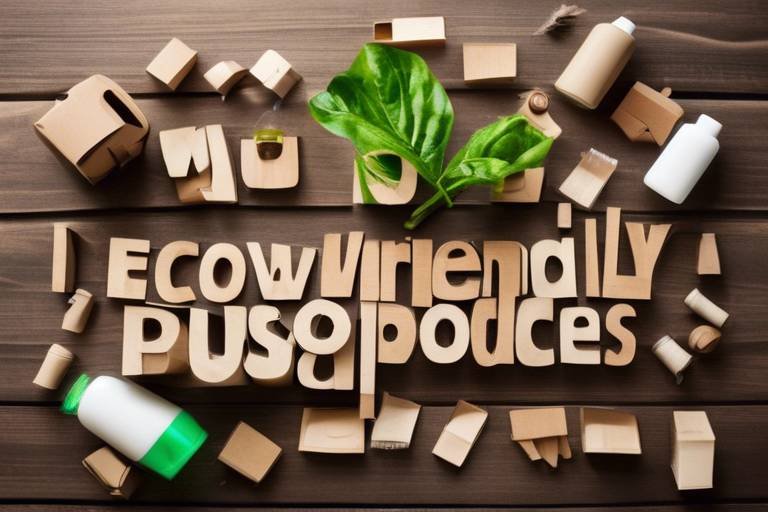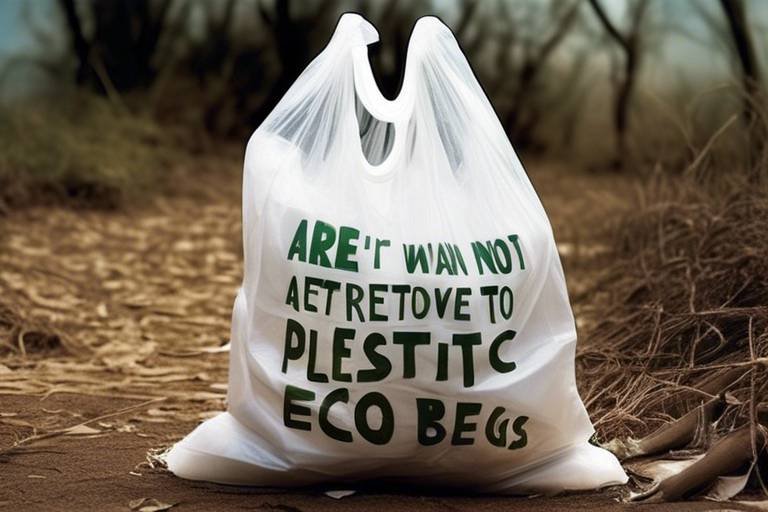Less Waste, More Saving - The Eco-Friendly Way
In today’s fast-paced world, the concept of reducing waste while saving money may seem like a daunting challenge. However, it’s not only possible but also incredibly rewarding! Imagine a lifestyle where your choices not only lighten your financial load but also contribute positively to our planet. Sounds appealing, right? Well, it’s time to explore practical strategies that can transform your life into an eco-friendly journey, ensuring that you spend less while doing your part for the environment.
So, what exactly does it mean to reduce waste? It's all about mindful consumption—making conscious choices that minimize excess. By adopting a waste-conscious lifestyle, you’re not just cutting down on clutter; you’re paving the way for a sustainable future. It’s like planting a seed today that will grow into a lush tree tomorrow, providing shade and nourishment for generations to come.
Now, let’s dive into the nitty-gritty of why reducing waste is crucial. First and foremost, it contributes significantly to environmental sustainability. When we reduce waste, we’re decreasing the amount of garbage that ends up in landfills, which in turn diminishes harmful emissions and pollution. But that’s not all! There are also financial benefits that come with this eco-friendly approach. By being more conscious about what we consume, we can cut down on unnecessary purchases, thus saving money. It’s a win-win situation!
Picture this: every time you choose to reuse a container instead of buying a new one, you’re not just saving a few bucks; you’re also reducing the demand for new products. This ripple effect leads to a healthier planet and a healthier wallet. Isn’t it amazing how our choices can create such a profound impact?
As we embrace these eco-friendly practices, we can unlock a treasure trove of advantages. From financial savings to improved health, the benefits are numerous. For instance, by choosing to buy in bulk and planning meals ahead, you can significantly cut down on food waste and save money at the same time. It’s like finding a hidden gem in your budget!
In a nutshell, adopting a waste-reduction mindset not only helps the environment but also enhances your quality of life. So, let’s embark on this journey together and discover how we can make a difference—one small step at a time. Are you ready to dive deeper into the world of eco-friendly practices? Let’s go!
- What are some easy ways to reduce waste at home?
Start by using reusable bags, containers, and bottles. Composting food scraps and recycling paper and plastics can also make a significant difference. - How can reducing waste save me money?
By purchasing less and reusing items you already have, you cut down on unnecessary expenses. Plus, bulk buying can lead to significant savings over time. - Are eco-friendly products more expensive?
While some sustainable products may have a higher upfront cost, they often save you money in the long run due to their durability and effectiveness. - How can I get involved in my community's waste reduction efforts?
Participate in local clean-up events, support recycling initiatives, and advocate for sustainable practices in your neighborhood.

Understanding Waste Reduction
Waste reduction is not just a trendy buzzword; it's a crucial practice that impacts our planet and finances significantly. Imagine living in a world where landfills are overflowing, ecosystems are suffering, and your wallet is perpetually empty. Sounds bleak, right? That's why understanding waste reduction is essential. It involves minimizing the amount of waste we generate, which not only helps in conserving natural resources but also leads to a more sustainable way of living.
By adopting waste reduction strategies, we can contribute to environmental sustainability. This means less pollution, fewer greenhouse gas emissions, and a healthier planet for future generations. But it’s not just about saving the Earth; it’s also about saving money. Have you ever thought about how much you spend on disposable products or excessive packaging? Reducing waste can lead to significant financial benefits, allowing you to allocate your hard-earned cash to more meaningful experiences rather than unnecessary purchases.
So, what does waste reduction really entail? Here are a few key concepts:
- Reduce: Cut down on the amount of waste you create.
- Reuse: Find new ways to use items instead of throwing them away.
- Recycle: Properly dispose of materials to be processed and reused.
These three principles form the foundation of waste reduction. They encourage us to think critically about our consumption habits and the lifecycle of the products we use. For instance, instead of buying a new plastic water bottle every time you're thirsty, consider investing in a reusable one. Not only will this save you money in the long run, but it also reduces plastic waste that ends up in our oceans.
Moreover, embracing a waste-conscious lifestyle can lead to a ripple effect. When you make small changes, like composting food scraps or shopping with reusable bags, you inspire those around you to rethink their habits. It's a community effort! Together, we can create a culture that values sustainability, leading to broader societal changes.
In summary, understanding waste reduction is about recognizing the dual benefits of protecting our environment and saving money. It’s a win-win situation that requires collective effort and individual commitment. So, next time you consider tossing something in the trash, think twice—your choices can make a significant difference!

Benefits of Going Green
Going green isn't just a trendy phrase; it's a lifestyle choice that comes with a plethora of benefits that can transform your life and the world around you. Imagine waking up every day knowing that your choices are making a positive impact on the environment while also putting a little extra money back in your pocket. Sounds appealing, right? Let's dive into the numerous advantages of adopting eco-friendly practices!
First off, one of the most compelling reasons to go green is the financial savings it can bring. When you start to reduce your waste, you're not just helping the planet; you're also cutting down on costs. Think about it: less trash means fewer trips to the landfill, which translates to lower disposal fees. And when you purchase less because you’re reusing and recycling, your shopping bills shrink. It’s like finding hidden treasure in your wallet!
Moreover, adopting a green lifestyle often leads to improved health. By choosing organic products and reducing exposure to harmful chemicals found in many conventional goods, you’re not only helping the environment but also enhancing your well-being. This holistic approach to health can lead to fewer medical bills and a happier, more vibrant life. Just picture yourself feeling energized and alive, thanks to the wholesome choices you’ve made!
Another significant benefit is the positive impact on our planet. By reducing waste, we contribute to decreased pollution, conserve natural resources, and promote biodiversity. It’s like being part of a massive team effort to heal the Earth! Each small action, whether it's composting scraps or choosing to walk instead of drive, adds up to create a substantial impact. The more we engage in these eco-friendly practices, the healthier our planet becomes.
To give you a clearer picture, here’s a simple table summarizing the benefits of going green:
| Benefit | Description |
|---|---|
| Financial Savings | Lower disposal costs, reduced shopping expenses, and more money in your pocket. |
| Improved Health | Better well-being through reduced exposure to harmful chemicals and healthier food choices. |
| Environmental Impact | Less pollution, conservation of resources, and enhanced biodiversity. |
In essence, going green is not just an environmental choice; it's a comprehensive lifestyle shift that enriches your life in countless ways. It’s about creating a better world for ourselves and future generations. So, why not take the plunge? Every action counts, and together, we can make a difference!
Q: How can I start going green?
A: Start small! You can reduce waste by recycling, composting, and choosing reusable products over single-use items. Every little bit helps!
Q: Are eco-friendly products more expensive?
A: While some eco-friendly products may have a higher upfront cost, they often save you money in the long run through durability and reduced waste.
Q: What are some easy eco-friendly practices I can implement at home?
A: Simple practices include reducing plastic use, conserving water, and using energy-efficient appliances. Little changes make a big difference!

Financial Savings
When we think about the concept of , it often conjures up images of strict budgets and endless sacrifices. But what if I told you that reducing waste could actually lead to a more comfortable financial situation? Imagine a life where you not only contribute to a healthier planet but also keep more money in your pocket. Sounds appealing, right? By adopting eco-friendly practices, you can achieve both goals simultaneously.
One of the most straightforward ways to save money is by lowering your disposal costs. Every time you throw something away, you're not just discarding it; you're also paying for its disposal. In fact, many municipalities charge fees based on the volume of waste you produce. By reducing the amount of waste you generate, you can significantly cut down on these costs. Think of it as trimming the fat from your budget—less waste means fewer fees and more savings.
Moreover, reducing waste often leads to reduced purchasing. When you start to think critically about what you buy, you'll likely find that many items are unnecessary. For instance, instead of buying pre-packaged snacks, consider making your own at home. Not only will you save money, but you'll also have the satisfaction of knowing exactly what goes into your food. This shift in mindset can lead to substantial savings over time.
Another financial benefit comes from efficient resource management. By being mindful of how you use resources—like electricity, water, and even your time—you can make smarter decisions that save you money. For example, investing in energy-efficient appliances may require a higher upfront cost, but the long-term savings on your utility bills can be significant. It’s like planting a seed today that will yield fruits for years to come.
To illustrate these points, consider the following table that breaks down potential savings from common waste-reducing practices:
| Practice | Potential Monthly Savings |
|---|---|
| Meal Planning | $50 |
| Bulk Buying | $30 |
| DIY Household Products | $20 |
| Composting | $15 |
As you can see, making small changes can add up to significant savings over time. The beauty of these practices is that they not only help your wallet but also contribute to a more sustainable lifestyle. You might even find that the more you embrace these changes, the more creative and resourceful you become!
Ultimately, the journey towards financial savings through waste reduction is not just about cutting costs; it’s about transforming your mindset. It’s about realizing that every little effort counts. By making conscious choices today, you pave the way for a more secure financial future while also taking care of the environment. So, why not start today? Your wallet—and the planet—will thank you!
- What are some easy ways to start reducing waste at home? Start by recycling, composting, and using reusable bags and containers. Meal planning can also help minimize food waste.
- How can reducing waste save me money? By generating less waste, you lower disposal costs, reduce unnecessary purchases, and save on resources like water and electricity.
- Are there any upfront costs associated with going green? While some eco-friendly products may have higher initial costs, they often lead to long-term savings through reduced consumption and waste.

Budget-Friendly Tips
When it comes to reducing waste, the idea of saving money may seem like a daunting task. However, embracing eco-friendly practices can actually lead to significant savings in your wallet. Imagine walking into your kitchen and seeing not just a clean space, but one that reflects your commitment to both the environment and your budget. By implementing a few simple strategies, you can transform your home into a hub of sustainability while keeping your finances in check. So, how do you get started?
First off, meal planning is an absolute game-changer. By planning your meals for the week, you can minimize food waste and save money on groceries. Think of it as creating a roadmap for your meals. When you know what you're going to cook, you can buy only what you need, reducing the chances of those pesky leftovers going bad. Plus, it allows you to get creative with your cooking, experimenting with ingredients you might not usually use!
Next up, consider bulk buying. Purchasing items in larger quantities not only cuts down on packaging waste but also often comes with a lower price tag. Just imagine stocking up on grains, nuts, and dried fruits—items that have a long shelf life and can be used in a variety of recipes. However, it's essential to keep an eye on expiration dates and only buy what you can realistically consume. This approach is like planting seeds for your future savings; the more you buy wisely, the more you'll reap the benefits.
Another fantastic way to save money while being eco-conscious is through DIY projects. Instead of buying new items, why not get crafty? Whether it's making your own cleaning products or repurposing old furniture, DIY not only saves money but also adds a personal touch to your home. Plus, there's something incredibly satisfying about creating something from scratch. You might even find a new hobby along the way!
To illustrate the potential savings, check out the table below that compares the costs of traditional shopping versus bulk buying:
| Item | Traditional Purchase Cost | Bulk Purchase Cost | Potential Savings |
|---|---|---|---|
| Rice (2 lbs) | $3.00 | $2.00 | $1.00 |
| Olive Oil (16 oz) | $8.00 | $6.00 | $2.00 |
| Toilet Paper (12 rolls) | $10.00 | $7.50 | $2.50 |
As you can see, the savings can really add up! Lastly, don't forget about energy-efficient solutions. Switching to LED light bulbs or unplugging devices when they're not in use can lead to lower electricity bills. It's like giving your wallet a little workout—stronger and healthier for the long run!
In conclusion, adopting these budget-friendly tips is not just about cutting costs; it's about fostering a lifestyle that values sustainability and efficiency. By meal planning, buying in bulk, engaging in DIY projects, and implementing energy-saving practices, you can create a home that not only reduces waste but also enhances your financial well-being. So, are you ready to take the plunge into a more eco-friendly, budget-conscious lifestyle?
- What are some easy ways to start reducing waste at home? Begin with simple changes like using reusable bags, composting, and reducing single-use plastics.
- How can I involve my family in waste reduction efforts? Make it a fun challenge! Set goals together, like reducing food waste or recycling more, and celebrate your successes.
- Are there any apps that can help with meal planning? Yes! There are several apps available that can assist in meal planning and grocery shopping, making it easier to stay organized.

Long-Term Investments
When we think about making eco-friendly choices, it’s easy to focus on the immediate benefits, like saving a few bucks on your grocery bill or reducing your plastic use. However, the real magic happens when you start to consider in sustainability. Imagine this: every dollar you spend on sustainable products or practices is like planting a seed for future savings. Over time, these seeds grow into a flourishing garden of financial benefits and environmental impact.
Investing in quality, sustainable products often means you won't have to replace them as frequently as their cheaper, less eco-friendly counterparts. For instance, consider a high-quality, reusable water bottle. While it might cost more upfront than a pack of single-use bottles, think about how many times you’ll refill it. In the long run, you’re not only saving money but also significantly reducing plastic waste. It’s a win-win!
Moreover, adopting energy-efficient appliances can drastically lower your utility bills over time. Although the initial investment might seem daunting, the savings on your energy bill can be substantial. For example, a smart thermostat can help you manage your home’s heating and cooling more efficiently, leading to savings of up to 10-20% on your energy costs. Just imagine what you could do with that extra cash every month!
Let’s break it down further. Here’s a quick comparison of upfront costs versus long-term savings for a few common eco-friendly investments:
| Eco-Friendly Investment | Upfront Cost | Estimated Annual Savings | Payback Period |
|---|---|---|---|
| LED Light Bulbs | $10 for a pack of 5 | $15 | Less than 1 year |
| Smart Thermostat | $200 | $200 | 1 year |
| Reusable Shopping Bags | $15 for 5 | $50 | Less than 1 year |
As you can see, the upfront costs may seem higher, but the long-term savings are undeniable. By making these investments, you not only contribute to a healthier planet but also build a more sustainable financial future for yourself.
Ultimately, the key to long-term investments in sustainability is to think ahead. Ask yourself: What can I do today that will benefit both my wallet and the environment tomorrow? By making informed choices and prioritizing sustainability, you’re not just saving money; you’re paving the way for a greener, more sustainable future.
- What are some examples of long-term eco-friendly investments? Long-term eco-friendly investments include energy-efficient appliances, solar panels, and high-quality reusable products.
- How can I determine if an eco-friendly product is worth the investment? Consider the product's lifespan, the potential savings on replacements or energy bills, and its environmental impact over time.
- Are there any government incentives for making eco-friendly investments? Yes, many governments offer tax credits or rebates for energy-efficient home improvements and renewable energy installations.

Environmental Impact
When we talk about waste reduction, we often focus on the personal benefits—like saving money or decluttering our homes. However, the of reducing waste is equally significant and deserves our attention. Every piece of waste we generate contributes to a larger problem: pollution, resource depletion, and the degradation of our planet. By adopting eco-friendly practices, we can combat these issues and foster a healthier environment for future generations.
One of the most pressing environmental concerns is pollution. Landfills are overflowing, and as waste decomposes, it releases harmful gases like methane into the atmosphere. This not only contributes to climate change but also affects air quality. By reducing waste, we can minimize the amount of trash that ends up in landfills, thereby decreasing pollution levels. Additionally, less waste means less energy consumed in the production and transportation of goods, which also contributes to pollution.
Another critical aspect is the conservation of natural resources. Our planet's resources are finite, and excessive consumption leads to their rapid depletion. For instance, producing one ton of paper requires approximately 24,000 gallons of water and significant amounts of energy. By reducing our paper usage through digital alternatives or recycling, we can conserve water and energy, making a positive impact on our environment. Every small change we make can lead to larger, collective benefits.
Furthermore, waste reduction promotes biodiversity. When we reduce waste, we lessen the strain on ecosystems. For example, less plastic waste means fewer marine animals are harmed by ingesting or becoming entangled in plastic debris. Protecting our ecosystems is vital for maintaining biodiversity, which is essential for a healthy planet. A diverse ecosystem is more resilient and can better withstand environmental changes.
To illustrate the positive outcomes of waste reduction, consider the following table that outlines the benefits of reducing waste:
| Environmental Benefit | Description |
|---|---|
| Reduced Pollution | Less waste in landfills leads to lower emissions of harmful gases and toxins. |
| Conservation of Resources | Minimizing waste helps preserve natural resources like water, trees, and minerals. |
| Enhanced Biodiversity | Reducing waste protects habitats and supports the survival of various species. |
In summary, the environmental impact of reducing waste goes far beyond personal benefits. It’s about creating a sustainable future where our actions today lead to a healthier planet tomorrow. Each time we choose to recycle, compost, or opt for sustainable products, we contribute to a larger movement towards environmental conservation. So, let’s not underestimate the power of our choices; they can create ripples of change that benefit not just us, but the entire Earth.
- What are some simple ways to reduce waste at home? Start by implementing recycling and composting, using reusable bags and containers, and avoiding single-use plastics.
- How does reducing waste save money? By buying only what you need, reducing food waste, and opting for second-hand items, you can significantly cut down on expenses.
- Can waste reduction really impact the environment? Absolutely! Every small effort contributes to less pollution, resource conservation, and the protection of biodiversity.

Practical Steps to Reduce Waste
Reducing waste isn't just a trend; it's a lifestyle choice that can significantly impact our environment and our wallets. So, how can we make this shift in our daily lives? Let's dive into some practical steps that can help you minimize waste effectively. First and foremost, it’s essential to understand that every little action counts. Whether it’s small changes in your home or larger community initiatives, your efforts can lead to a ripple effect.
One of the simplest yet most effective ways to start reducing waste is by embracing recycling and composting. Recycling helps divert materials from landfills, while composting organic waste not only reduces landfill contributions but also enriches your garden soil. Imagine transforming your kitchen scraps into nutrient-rich compost that nourishes your plants! It’s like giving back to the earth while simultaneously reducing your waste footprint.
Next, consider choosing sustainable products. This means opting for items that are made from recycled materials, are biodegradable, or come with minimal packaging. For example, when shopping for groceries, try to select products that have less plastic wrapping. You might be surprised at how many options are available that not only reduce waste but also support eco-friendly brands. By making these conscious choices, you not only help the planet but often find that these products are more durable and cost-effective in the long run.
Implementing energy-efficient solutions at home is another fantastic way to reduce waste. This could be as simple as switching to LED light bulbs or investing in energy-efficient appliances. Not only do these changes help reduce energy consumption, but they also lower your utility bills. Think of it like this: every time you turn off a light or unplug an appliance, you’re not just saving energy; you’re also saving money. It’s a win-win!
Additionally, consider reducing single-use plastics in your daily life. This could mean carrying a reusable water bottle, using cloth bags for shopping, or bringing your own containers for takeout. These small changes can significantly cut down on the plastic waste that often ends up in our oceans and landfills. It’s like swapping out a single-use item for something that can be used repeatedly; you’re not just reducing waste, you’re also setting an example for others.
Finally, don’t underestimate the power of community involvement. Engaging with local initiatives can amplify your waste reduction efforts. Participate in community clean-up events, support local farmers' markets, or join a zero-waste group. When you come together with others who share your passion for sustainability, you can create a larger impact. It’s like planting seeds of change in your community—each action taken collectively can lead to a flourishing environment.
In summary, reducing waste is not just about individual actions; it's about creating a culture of sustainability. By incorporating these practical steps into your daily routine, you can contribute to a healthier planet while also enjoying the financial benefits that come with it. Remember, every effort counts, and together, we can pave the way for a greener future.
- What are the easiest ways to start reducing waste at home? Start with recycling and composting, choosing reusable products, and reducing single-use plastics.
- How does reducing waste save money? By minimizing the need for new purchases and lowering disposal costs, you can save significantly over time.
- Can I make a difference as an individual? Absolutely! Individual actions, when multiplied across communities, can lead to significant environmental change.
- What role does community involvement play in waste reduction? Community efforts amplify individual actions, creating a larger impact through collective initiatives.

Home Practices
When it comes to reducing waste, your home is the perfect starting point. Think of your home as a small ecosystem where every action you take can either contribute to or detract from the health of the planet. By adopting simple yet effective home practices, you can significantly minimize waste while also saving money. Isn’t it exciting to know that small changes can lead to big impacts? Let’s dive into some practical strategies that you can implement right away!
One of the most effective home practices is to **reduce single-use plastics**. These pesky items, like plastic bags and straws, are often used for just a few minutes but can take hundreds of years to decompose. Instead, consider investing in reusable alternatives. For instance, swap out plastic bags for cloth ones, and use stainless steel or bamboo straws. Not only do these alternatives reduce waste, but they also add a touch of style to your daily routine. Imagine sipping your favorite drink through a sleek, reusable straw—it feels good, doesn’t it?
Another eco-friendly practice is to **implement energy-efficient solutions** around your home. This goes beyond just switching to LED light bulbs (though that’s a great start!). Consider investing in energy-efficient appliances that consume less power and water. By doing this, you not only cut down on your energy bills but also lessen your carbon footprint. For example, a high-efficiency washing machine uses about 25% less energy and 33% less water than a standard model. Over time, these savings can really add up!
Moreover, composting is a fantastic way to reduce kitchen waste. Instead of tossing vegetable scraps and peels into the trash, why not turn them into nutrient-rich compost? This practice not only diverts waste from landfills but also enriches your garden soil. If you're new to composting, start with a small bin and gradually add organic materials like fruit and vegetable scraps, coffee grounds, and eggshells. Just imagine how rewarding it will be to see your kitchen waste transform into something beneficial for your plants!
Additionally, consider adopting a **minimalist mindset**. This doesn’t mean you have to live with only a few possessions, but rather, it encourages you to be mindful of what you bring into your home. Before making a purchase, ask yourself if you truly need it or if it will just end up as clutter. This practice not only reduces waste but also helps you save money by avoiding unnecessary purchases. Think of it as a way to curate your living space—each item should bring you joy or serve a purpose!
Lastly, don’t forget about the power of community. Engaging with your neighbors can amplify your waste reduction efforts. Organize a neighborhood swap event where everyone can exchange items they no longer need. This not only reduces waste but also fosters a sense of community. Plus, you might just find that perfect item you’ve been searching for without spending a dime!
Q: What are some easy ways to start reducing waste at home?
A: Start by reducing single-use plastics, composting kitchen scraps, and being mindful of your purchases. Simple changes like using reusable bags and containers can make a big difference!
Q: How can I get my family involved in waste reduction?
A: Involve your family by making it a fun challenge! Set goals together, like reducing plastic use or starting a compost bin, and celebrate your successes as a team.
Q: Are there any financial benefits to reducing waste?
A: Absolutely! Reducing waste often leads to lower disposal costs, decreased spending on single-use items, and savings from buying in bulk or investing in durable products.
Q: Can I compost if I live in an apartment?
A: Yes! Many urban areas offer composting services, and you can also use indoor compost bins or worm composting systems to manage food scraps in smaller spaces.

Community Involvement
When it comes to making a real impact on waste reduction, plays a crucial role. Imagine this: a group of passionate individuals coming together, each bringing their unique skills and ideas to the table, all with the common goal of creating a cleaner, greener environment. Sounds inspiring, right? Involvement in community initiatives not only fosters a sense of belonging but also amplifies the effects of individual actions. By participating in local events, you can collaborate with others who share your eco-friendly values, making the journey towards sustainability a collective effort.
One of the most effective ways to get involved is by participating in local clean-up events. These gatherings often bring together volunteers who dedicate their time to picking up litter in parks, beaches, and neighborhoods. Not only do these events beautify the community, but they also raise awareness about the importance of keeping our surroundings clean. Plus, there’s something incredibly rewarding about seeing the tangible results of your efforts. You can literally watch the transformation unfold right before your eyes!
Additionally, supporting zero-waste initiatives in your area can significantly contribute to reducing waste. Many communities are now embracing the concept of zero waste, which aims to minimize landfill contributions by rethinking how we consume and dispose of products. You can get involved by:
- Attending workshops on sustainable practices
- Joining local advocacy groups focused on waste reduction
- Promoting and participating in community recycling programs
Moreover, you can also help spread the word about eco-friendly practices within your community. Organizing informational sessions or starting a blog about your experiences can inspire others to join the movement. Remember, every small action counts, and when multiplied by the number of people in your community, the impact can be monumental!
As you engage with your community, you’ll likely find that the connections you make not only enhance your understanding of sustainable practices but also create a support network that encourages ongoing commitment to eco-friendly living. In this way, community involvement becomes a powerful catalyst for change, proving that together, we can achieve what we might struggle to accomplish alone.
Q1: How can I find local clean-up events?
A1: Check local community boards, social media groups, or websites dedicated to environmental initiatives. Many organizations regularly post about upcoming clean-up events.
Q2: What are zero-waste initiatives?
A2: Zero-waste initiatives aim to reduce the amount of waste sent to landfills by encouraging recycling, composting, and reusing materials whenever possible.
Q3: How can I get my friends involved in community clean-up efforts?
A3: Start by sharing your experiences and the positive impacts of these events. You can also organize a group outing to a clean-up event, making it a fun day out!

Conclusion: A Sustainable Future
As we navigate through the complexities of modern living, it's crucial to recognize that our choices have a profound impact on the planet. Embracing eco-friendly practices is not just a trend; it's a responsibility that we all share. By reducing waste, not only do we contribute to a healthier environment, but we also pave the way for a sustainable future that benefits everyone. Imagine a world where our daily actions—like opting for reusable bags or composting food scraps—lead to cleaner air, less pollution, and a thriving ecosystem. Isn't that a vision worth striving for?
It's essential to understand that every small effort counts. Whether you're a seasoned environmentalist or just starting your journey toward sustainability, your actions can create a ripple effect. When individuals come together, they form a powerful collective force capable of driving significant change. This means participating in community initiatives, advocating for sustainable policies, and sharing knowledge about waste reduction with friends and family. The more we engage with one another, the more we amplify our impact.
Moreover, the financial benefits of adopting eco-friendly practices cannot be overlooked. As we discussed earlier, reducing waste can lead to substantial savings. It's like finding hidden treasure in your own home! By making conscious choices, such as buying in bulk or investing in quality products that last longer, we not only save money but also contribute to a circular economy that minimizes waste. In this way, our wallets and the Earth can thrive together.
In conclusion, the path to a sustainable future is paved with collective action and a commitment to making informed choices. As we move forward, let's remember that every effort, no matter how small, contributes to a larger goal. Together, we can create a world where waste is minimized, resources are conserved, and future generations can enjoy a vibrant planet. So, let's take that first step today—because a sustainable future starts with us!
- What are some easy ways to reduce waste at home? Start by composting food scraps, using reusable bags, and avoiding single-use plastics.
- How can I get involved in my community's sustainability efforts? Look for local clean-up events, join environmental groups, or support local farmers' markets.
- Are there financial benefits to going green? Absolutely! Reducing waste can lower your disposal costs and help you save on purchases by using less.
- What are sustainable products? These are items designed to have a minimal environmental impact, such as biodegradable materials or products made from recycled resources.
Frequently Asked Questions
- What is waste reduction and why is it important?
Waste reduction refers to the strategies and practices aimed at minimizing the amount of waste generated in daily life. It’s important because it not only helps in conserving natural resources but also reduces pollution and lowers disposal costs. By adopting waste reduction practices, individuals can contribute to a healthier planet while also saving money.
- How can I save money while being eco-friendly?
There are numerous ways to save money while adopting eco-friendly practices. For instance, meal planning can help you avoid food waste and save on grocery bills. Buying in bulk reduces packaging waste and often comes with discounts. Additionally, investing in durable, sustainable products can save you money in the long run by reducing the need for frequent replacements.
- What are some practical steps I can take to reduce waste at home?
To reduce waste at home, consider implementing simple practices like composting kitchen scraps, using reusable bags and containers, and reducing single-use plastics. You can also make a habit of recycling and donating items you no longer need instead of throwing them away.
- How does community involvement help in waste reduction?
Community involvement amplifies waste reduction efforts by fostering a sense of collective responsibility. Participating in local clean-up events, supporting zero-waste initiatives, and spreading awareness about eco-friendly practices can inspire others to join the cause, creating a larger impact.
- What are the long-term benefits of investing in sustainable practices?
Investing in sustainable practices yields long-term benefits, including reduced costs associated with waste disposal and the need for replacements. Sustainable products tend to be more durable, which means you’ll spend less over time. Additionally, these practices contribute to a healthier environment, which benefits everyone.
- Can waste reduction contribute to improved health?
Absolutely! Waste reduction often leads to healthier choices, such as cooking at home instead of relying on processed foods that come with excessive packaging. Moreover, reducing pollution through waste management can lead to cleaner air and water, directly benefiting your health and well-being.



















